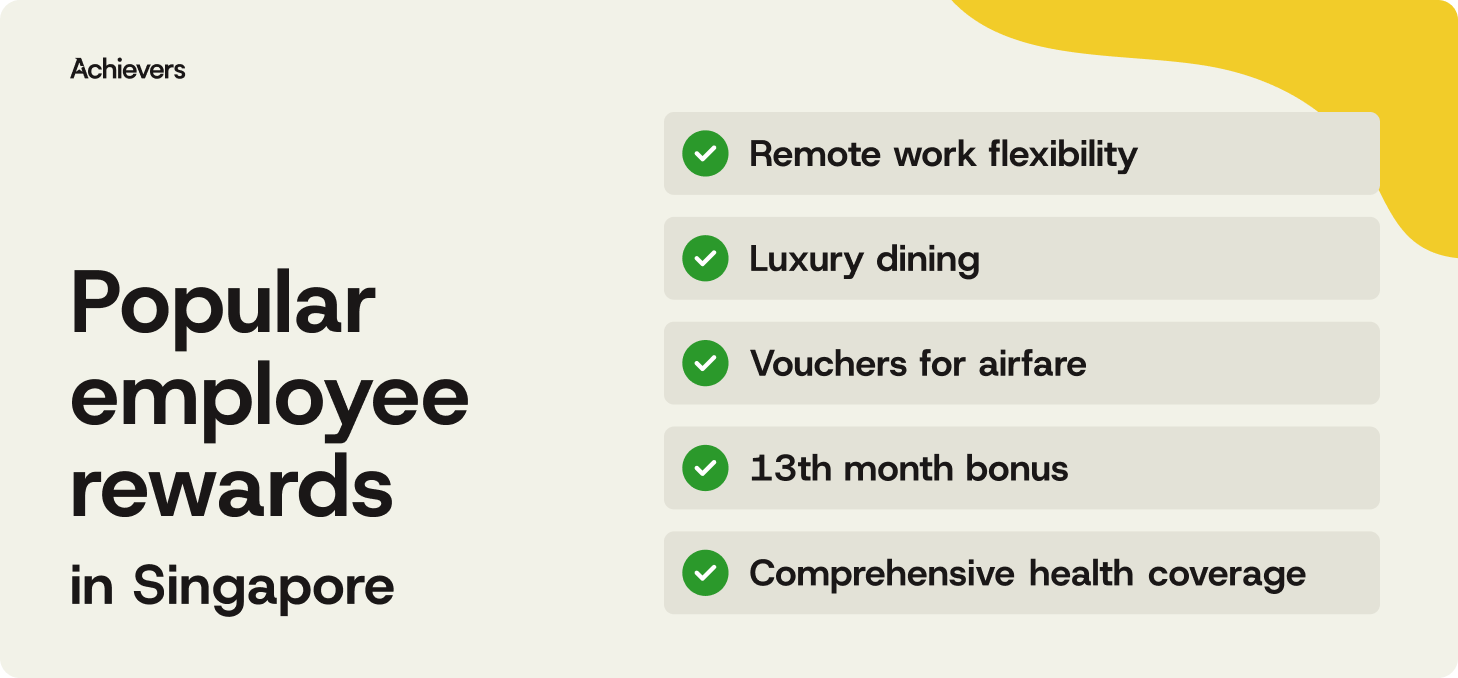Table of contents
Create a culture that means business™
Schedule a demo with an Achievers solution expert today.
Singapore’s job market isn’t just competitive — it’s practically a full-contact sport. And as it evolves, so too must the way employers think about compensation and benefits. In fact, almost 40% of Singaporean employees had plans to jump ship in 2024. That’s not just a ripple; it’s a wave.
To stay afloat — and ideally ahead — companies need to shift their focus from traditional perks to something more meaningful. Today’s workforce is younger, more mobile, and far less impressed by a ping-pong table in the break room. They’re after rewards that actually enhance their lives: wellness programs that go beyond free fruit, experiences they’ll remember (in a good way), and a work-life balance that doesn’t involve answering emails at midnight.
In short, a well-designed, locally relevant rewards program is a key weapon in the battle for talent retention.
The role of employee rewards in Singapore
In the past, a competitive salary was enough to attract the most competitive talent. But now? Yes, compensation still tops the list for Singaporean jobseekers — but it’s no longer the only thing on the menu. Today’s employees are looking at the full rewards platter, not just the paycheck.
A report from Deloitte Southeast Asia on the optimal value of employee rewards points toward creating a more human-centric employee rewards platform. One-size-fits-all rewards aren’t going to deliver the value of a more individualized approach. Singapore has one of the most diverse workforces in the world, and that means companies need to take on a more flexible, personalized approach to rewards.
Government rules already shape much of the compensation landscape in Singapore. The Annual Wage Supplement — better known as the 13th month bonus — has been capped at one month’s salary since 1988, and CPF contributions are a shared responsibility between employer and employee. With those levers fixed, companies looking to truly boost employee engagement will need to get creative. Hint: it’s time to think beyond bonuses and retirement plans.
Types of popular employee rewards in Singapore
What motivates you in the morning — after your morning coffee, anyway? A well-designed employee engagement program takes a broad approach to the employee experience and gets employees excited about their work. Motivating rewards are powerful tools for business leaders who want to shape their workforce and drive better business results.

1. Monetary incentives
As in much of the world, monetary incentives remain a top priority for employees in Singapore. Here are a few examples you could introduce (if you haven’t already):
- Performance-based bonuses: Tangible rewards that directly link individual contributions to financial incentives — motivating employees to go the extra mile.
- 13th month bonus: While not mandatory, this annual bonus is widely expected in Singapore and highly valued — think of it as a cultural norm with a paycheck.
- Annual salary increments: Regular pay raises help offset the rising cost of living and reduce turnover by giving employees fewer reasons to job hop.
- Commissions: Common in sales and customer-facing roles, commissions offer a clear, direct connection between performance and pay — perfect for high achievers.
2. Career growth opportunities
When it comes to employee retention, and opportunities for future career growth are highly valued by younger members of the workforce. You fought hard to get where you are. It shouldn’t be a surprise that your most talented employees have the drive to do the same. If you want to keep that momentum going, try these out and see what happens:
- Sponsorship for professional certifications: Employees recognize the value of opportunities for skill enhancement like PMP certification and leadership training.
- Promotion opportunities: Companies with clear career advancement pathways attract and retain employees with ambition and drive. No one wants to be put in a box at work.
- Mentorship programs: Leadership coaching and mentorship programs help junior employees tap into the wisdom and career advice of their senior colleagues.
3. Work-life balance perks
When it comes to work-life balance, employment rules in Singapore are changing. As of April 2024, employers now have a mandate to consider formal requests for flexible working arrangements from employees. Offering flexibility as a perk can distinguish your company as a leader in employee wellness. Here are a few examples of how to offer work-life balance rewards at work:
- Flexible working hours: The ability to adjust work hours around personal commitments is a quality-of-life perk highly valued by Gen Z and Millennial workers.
- Hybrid work options: Remote work flexibility creates better work-life balance. It’s a must-have benefit for many young families and makes your workplace more attractive to top talent.
- Extra paid leave: Wellness, personal, and family care days support work-life balance for all employees — not just parents. With Singapore’s shared parental leave increasing in 2026 to 10 weeks, forward-thinking companies can lead by offering inclusive, flexible time off now.
4. Health and wellness benefits
The health and wellness space is rich with potential employee rewards, and including health and wellness benefits demonstrates that your workplace cares about its employees’ health outside of regular working hours. Here’s how you can use health and wellness as a reward:
- Gym memberships or wellness programs: Free fitness memberships and wellness apps are tangible financial rewards highly valued by team members who prioritize their physical and mental wellbeing.
- Health insurance: Comprehensive health coverage for employees and their families is a major factor in attracting top talent, especially expat employees who do not qualify for Singapore’s public health care.
- Mental health support: Access to counseling services, mental health days, and stress management programs reduce burnout and turnover issues that come with fast-paced work environments.
5. Recognition and appreciation
Sometimes a “thank you” is the best reward. Employees want recognition for their hard work, and not all forms of appreciation have to be monetary. Say thanks by implementing the following:
- Employee of the month awards: Everyone wants to feel appreciated for the work they do. Public recognition for outstanding performance can be just as meaningful as any financial award that comes with it.
- Personalized thank-you notes or gifts: Thoughtful, individualized gestures of appreciation are more likely to stick than recognitions that feel automatic or universal.
- Public acknowledgment: Recognition during company-wide meetings or in internal communications is one of the smartest ways your organization can reinforce your company values and make employees feel seen, heard, and valued.
6. Unique experience-based rewards
Singapore’s workforce is now made up of 40% Millennials and 12% Gen Z, with the latter set to increase substantially in the next few years. These generations are less concerned with luxury products than luxury experiences, placing a higher value on experience-based awards. Here’s how to use experience-based rewards employees will love to your advantage:
- Travel vouchers: It should be no surprise that the Instagram generation put a lot of value on travel. Vouchers for airlines, hotels, and vacation experiences give experience-motivated employees a chance to get more out of their time off.
- Fine dining experience: Luxury dining and weekend getaway vouchers are smaller but no less sought-after rewards by those who live for the moment.
- Team-building activities: Organizing retreats, escape rooms, and recreational outings boosts morale and brings employees together. There’s nothing like breaking out of a zombie-themed escape room together to exercise those teamwork muscles.
7. Personalized rewards
Employee rewards work best when they’re personalized to the recipient. More company swag just isn’t going to move the needle when it comes to motivating employees. Points-based reward systems allow employees to pick their own personalized rewards from a number of great options. Here’s how to make rewards personal:
- Gift cards: Gift cards for employees provide flexibility to choose their own rewards. No one knows what kinds of rewards will be more impactful than the employees themselves.
- Customized gadgets or tech: A global rewards marketplace can give employees access to the latest gadgets like smartwatches or headphones. They choose the rewards they want the most.
- Charitable donations: Not everyone is motivated by gift cards, gadgets, or experiences. Charitable donations impact the philanthropists on your team and can be great motivators for high-income earners who are less concerned about monetary rewards.
8. Employee engagement programs
A successful employee engagement program focuses on bringing colleagues together through social events and occasions. They encourage coworkers to create bonds and build confidence with each other in the office. Here’s a few examples to help you kickstart employee engagement at your company:
- Recognition events or annual dinners: Social events like company dinners, award ceremonies, or celebration parties give business leaders an opportunity to publicly recognize and celebrate top performers. Make it a big deal when someone lands a big deal.
- Celebrating milestones: Acknowledging work anniversaries and project completions with gifts or special recognition reminds employees that they matter.
Aligning employee rewards with company values
A good rewards and recognition program doesn’t just say “thank you” — it says who you are. When recognition reflects your company’s values, it does more than boost morale; it shapes behavior, reinforces culture, and helps people understand what success really looks like.
That’s where Achievers comes in. Our platform makes it easy to reward and recognize employees consistently, frequently, and automatically — without needing to reinvent your workflows. It integrates with the tools you already use (yes, even that performance management system everyone pretends to like), so recognition becomes part of the everyday rhythm.
Because here’s the truth: people thrive when they know what’s expected — and when their efforts don’t go unnoticed. With Achievers, you’ll never miss a milestone, a win, or a chance to say, “You’re crushing it.”
Technological innovations in employee rewards in Singapore
Digital platforms like Achievers are streamlining rewards and recognition in Singapore today. Achievers fits seamlessly into your existing technology stack to deliver flexibility in your total compensation strategy.
The technology has evolved to give you a 360-degree view of your workforce without adding more work for HR and people leaders. AI-powered recognition programs identify high-potential employees, predict areas where recognition can prevent burnout, personalize reward suggestions, and tailor authentic recognition messages to make sure they’re positively received.
Singaporean companies are jumping on the tech bandwagon — and for good reason. A 2025 survey by Alibaba Cloud reveals that 84% of businesses are exploring AI and other digital technologies. At the same time, HR teams are turning to AI-driven engagement platforms to help manage the unique challenges of remote and hybrid work. It’s a brave new world, and businesses are ready to embrace it — whether their employees are in the office or working from home in their pajamas.
The future of employee rewards in Singapore
You may not have a crystal ball when it comes to predicting the future of the workplace, but there are trends showing where things are going. Deloitte’s research into employee rewards in Southeast Asia points to a new, more human-centric era in rewards. Workplaces are rapidly changing, with remote and flexible work models further entrenching themselves in Singapore.
To navigate these changes, organizations are focusing on sustainability, mental health, and how to keep employees highly engaged in hybrid work models. Employee rewards programs that emphasize employee well-being, peer-to-peer recognition, and high-frequency recognitions keep hybrid workers in the fold and focused on delivering better results.
Adapting employee reward strategies for a thriving workforce in Singapore
Employee rewards are more than just a line item in compensation plans — they’re a key part of attracting and keeping top talent. In Singapore’s competitive, mobile, and diverse labor market, companies with innovative, personalized reward strategies will make their mark. With 35% of employees planning to switch roles, organizations must be proactive in their approach to retention and recruitment.
HR professionals, it’s time to reassess your rewards strategies. As the workforce gets younger, more flexible, and increasingly focused on health, wellness, and meaningful growth opportunities, the traditional reward models may no longer cut it. Invest in rewards that align with your company’s goals, and you’ll see your workplace thrive.



